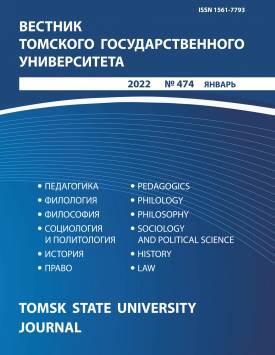Competency-based learning in the training of civil defense commissioners of educational institutions
The article actualizes the problem of training civil defense commissioners of educational institutions in the context of the manifestation of new types of threats (the COVID-19 pandemic, the phenomenon of shooting and explosions in educational institutions, etc.). At this stage of the development of the system of training specialists in civil defense, a contradiction has arisen between the need to train competent managers in the field of civil defense for educational institutions capable of solving a wide range of professional tasks and outdated approaches to professional development (including primary training) of these specialists. The aim of the study is to substantiate the effectiveness of the introduction of a competence-based approach in the training of civil defense commissioners of educational institutions as the main vector in professional development. To achieve this aim, the following research methods were used: analysis of normative legal acts, pedagogical literature, included observation, and pedagogical experiment. The study was conducted in the period from 2019 to 2021, the number of participants in the experiment was 78 people and included: students of the Educational and Methodological Center for Civil Defense of Tomsk Oblast and Civil Protection Courses in Tomsk; civil defense commissioners of educational institutions of Tomsk Oblast; persons exercising control and supervisory functions in the field of civil defense. The implementation of the competence approach was achieved through the introduction of innovations in the training program of the experimental group and consisted in: shifting the main vector of training specialists in the civil defense of educational institutions to the holistic formation of competencies rather than knowledge, skills and abilities; carrying out visits with the analysis of specific civil defense systems of institutions, the Tomsk College of Civil Transport and the Tomsk Industrial Technical School; conducting scheduled evacuation training sessions from classes with students from the experimental group; carrying out the final defense of complex projects that allow assessing the holistic view of the individual about the studied subject. According to the data obtained as a result of the study, the value of the overall level of competencies in the control and experimental groups has changed by 15% and 26%, respectively, since the beginning of training. The efficiency indicator of the introduction of the competence approach was 11%, which, taking into account the limited number of training hours (72 hours), can be characterized as a positive result. Summing up the overall result of the study, it should be emphasized that the implementation of the competence approach has shown sufficient effectiveness. At the same time, we believe, that an increase in the volume of training hours, taking into account the introduction of the proposed competence model, will allow us to achieve even more significant results.
Keywords
professional competencies, civil defense, civil defense commissioners in educational institutions, competence approach, anti-epidemic measures in educational institutionsAuthors
| Name | Organization | |
| Ayupov Radimir F. | National Research Tomsk State University | radpad@yandex.ru |
| Kostyukova Tat'yana A. | National Research Tomsk State University | kostykova@inbox.ru |
References

Competency-based learning in the training of civil defense commissioners of educational institutions | Vestnik Tomskogo gosudarstvennogo universiteta – Tomsk State University Journal. 2022. № 474. DOI: 10.17223/15617793/474/1
